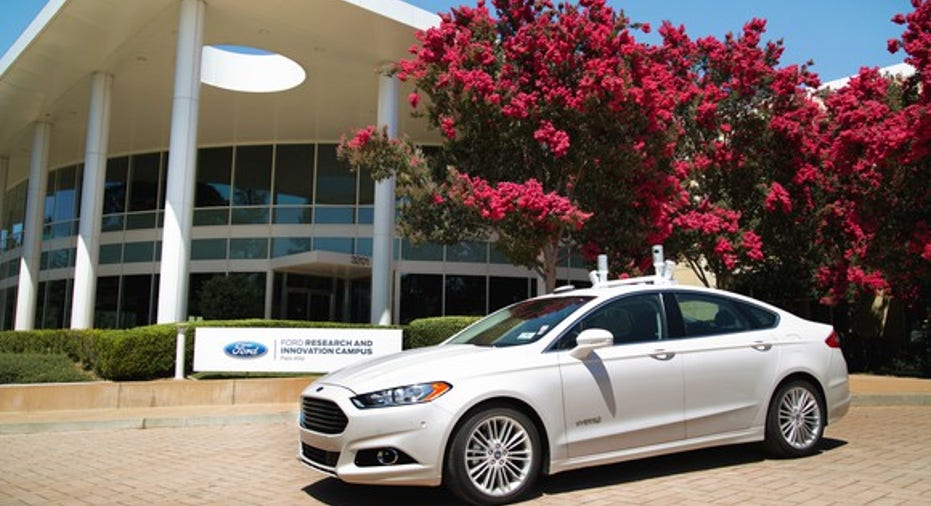What Ford Wants Investors to Know About Its High-Tech Partnerships

Ford's Research and Innovation Center in PaloAlto is a keycenter of its self-driving efforts. It will be significantly expanded over the next year or so. Image source: Ford Motor Company.
Ford Motor Company's(NYSE: F) announcement that it will aim to mass-produce a fully self-driving car by 2021 got a lot of attention on Tuesday, and rightly so.
But there was more to Ford's announcement: It has broughtseveral new high-tech collaborators on board to assist its self-driving effort, and it wants itsinvestors to know. Here's a look at who they are and what they'll contribute.
The collaborators
Velodyne
This isn't a new relationship; Ford has worked with Velodyne, a leading maker of compact LiDAR sensors, for a while. The announcement was that Ford and Chinese search-engine giant Baidu (NASDAQ: BIDU) have each invested $75 million in Velodyne to help it put its sensors into mass production. LiDAR, for "laser detection and ranging," is a radar-like technology that uses invisible laser beams to build highly detailed images of a vehicle's surroundings. LiDAR units are essential to Ford's (and Baidu's) self-driving technology, but reducing the units' cost will be essential to incorporating the technology into mass-market vehicles.
SAIPS
Ford has acquired SAIPS, an Israeli computer-vision and machine-learning company. Its expertise includes algorithmic solutions for image processing (essential for self-driving cars, which use cameras to help navigate) and deep learning (which helps self-driving cars learn and adapt to their surroundings). Ford didn't disclose the purchase price, but Israeli media reports say that it was in the "tens of millions of dollars."
Nirenberg Neuroscience LLC
Ford said it has an "exclusive licensing agreement" with this machine vision company. According to Ford, company founder Dr. Sheila Nirenberg "cracked the neural code the eye uses to transmit visual information to the brain." Ford says that the partnership "will help bring humanlike intelligence to the machine learning modules" of its self-driving system.
Civil Maps
Ford said that it has invested in Civil Maps, based in Berkeley, California. Self-driving cars using systems like Ford's rely on highly detailed three-dimensional maps of their environments to drive safely. Ford will need to create or acquire 3D maps of all of the areas in which its self-driving vehicles intend to operate. The company said that Civil Maps has "pioneered an innovative 3D mapping technique that is scalable and more efficient than existing processes," which should assist that effort.
Ford also said on Tuesday that it will expand its existing technical center in Palo Alto, California. It will add two new buildings with a total of 150,000 square feet of space and will double the center's workforce (to 260 employees) by the end of 2017.
A deliberate effort to make Ford's techdevelopments more visible to investors
I think Ford CEO Mark Fields is feeling the need to make Ford's high-tech efforts more visible, likely in response to investors who point to other companies making aggressive high-tech advances (notably General Motors (NYSE: GM) and Tesla Motors (NASDAQ: TSLA)) and ask whether Ford is going to be able to keep up.
Ford has been working on self-driving technology for over a decade, but mostly in secret. That has changed: Ford has recently made a point of talking about its high-tech connections -- and a point of ramping them up. Back in May, it announced that it had invested $182 million in Pivotal Software, a San Francisco-based company that helps established businesses improve their software-development efforts with a cloud-based platform. Ford began working with Pivotal last year, and it clearly found the relationship to be very valuable.
These latest announcements can be seen in the same light. Ford appears to be making solid progress with its self-driving efforts, and appears to have developed a high level of high-tech competence over the last few years. It wants its investors (and its rivals) to know about it.
A secret billion-dollar stock opportunity The world's biggest tech company forgot to show you something, but a few Wall Street analysts and the Fool didn't miss a beat: There's a small company that's powering their brand-new gadgets and the coming revolution in technology. And we think its stock price has nearly unlimited room to run for early in-the-know investors! To be one of them, just click here.
John Rosevear owns shares of Ford and General Motors. The Motley Fool owns shares of and recommends Baidu, Ford, and Tesla Motors. The Motley Fool recommends General Motors. Try any of our Foolish newsletter services free for 30 days. We Fools may not all hold the same opinions, but we all believe that considering a diverse range of insights makes us better investors. The Motley Fool has a disclosure policy.



















